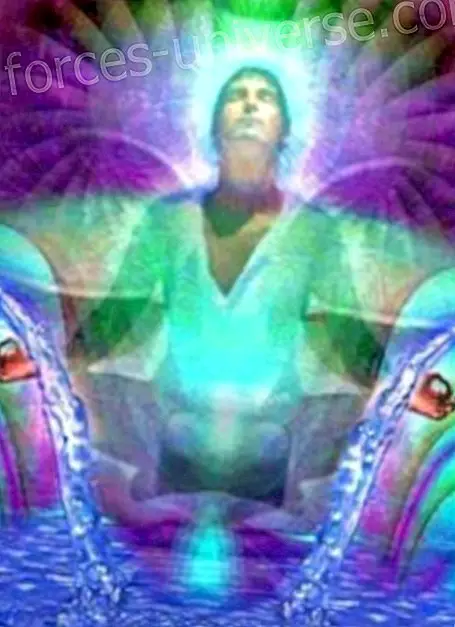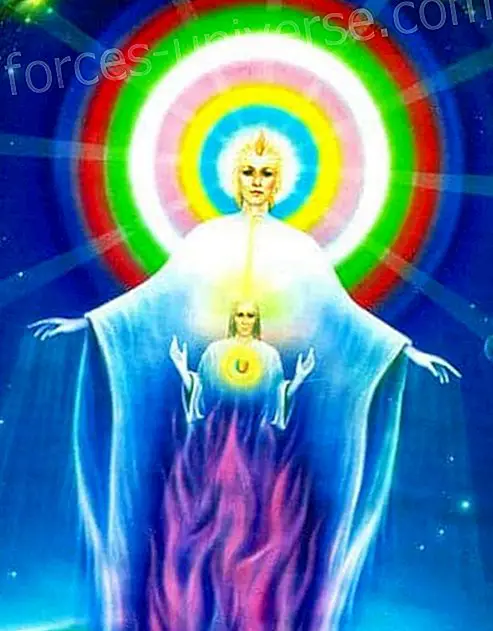
In general, people rarely have, and never recognize as such, the experience of essence. Thus, we will begin by considering a kind of experience related to it, of which one feels and speaks more commonly: the quality of presence. The expression "I am present" is often used in spiritual and psychological circles, assuming that the meaning is understood. We ask ourselves: What does this expression mean? What does it really mean to be present? Most of the time the expression is not used in a very defined or clear way; If asked, most people are unable to explain what it means to "be present."
But there must be a real condition that guarantees the use of the expression "I am present." She literally means that there is an "I" that is present in time. Is this literal meaning accurate?
Obviously when we say "I am present" we do not mean exactly that we are aware, otherwise we would say so. There is a difference between the meaning of "I am present" and the meaning of "I am aware", although the two can coincide frequently. What makes us say "present" instead of "conscious"? What is in the experience of "I am present" that is different from the experience of "I am aware?
We want to find out the meaning of presence by contemplating and analyzing the effective presence experience. Let's examine a family situation, the aesthetic experience. My eyes capture the vision of a beautiful red rose. Suddenly my eyesight is clearer, my nose more penetrating. It seems to me to be in my sight, it seems to me to be in my sense of smell. There is more of me here, watching, smelling and appreciating the rose.
This phenomenon is not simply one of increased awareness, but the more the rose is experienced through my eyes and nostrils, so the more the rose is experienced through my perceptual system.
In the experience of increased presence, it is as if I find my perceptions halfway. It is as if something of me, something more or less palpable, is present in my eyes and in my nose. Something in me, besides my perceptual channels, is participating in the experience of the rose and this is something that is not memory, nor past associations regarding roses.
In a sense, my greatest awareness really increases the presence of the rose, or any other aesthetic object, such as a piece of music or a painting. Sometimes a greater awareness only increases a certain quality of an object: the beauty of the rose, its color, its smell or its freshness. But sometimes the rose as rose, as a presence in itself, is felt. If that experience is deep enough, our own presence is intensified. "I seem to be more here, " would be the right expression. But what is this presence? Is there really a "me" that is more present or what is it, exactly? It may be the experience of amazement when confronted with the immensity of the ocean or the greatness of a mountain range. It can be the experience of admiration when one witnesses heroism in an individual or in a group, or the courage or fearlessness of an explorer.
We are considering the moments, although rare , when we feel as if there is something else about us participating in the experience. We want to understand what "more of us" means More than what? What is the element that gives our experience this flavor of presence?
We are also aware that some individuals have a greater presence than others. We say He has more presence , or He has an imposing presence . But can we say what are we really referring to? We are not referring to the quality of the presence of the mind, which is a greater awareness. The presence itself is more than that.
The presence can also be felt in moments of intense and deep emotion when a person is fully feeling an emotional state, not controlling or inhibiting it, when they are sincerely involved in the feeling, totally immersed in it in a free and spontaneous way without judgment or hesitation. This usually happens when the person feels totally justified in feeling the emotions.
For example, an individual might have the experience of a loss, such as the death of a loved one, and thus feel justified in feeling grief and sadness. He could get so involved in sadness, be so immersed in it, that the feelings will deepen as if they were miles deep, reaching deeper and deeper depths . This state could become so excessive and dense as it becomes more immersed in it, so deep and deep enough to feel penetrated by a kind of presence. It is as if the depth and depth were a real presence, palpable and completely clear there.
Another example: a person may feel justified in having anger and outrage at being insulted or treated unfairly. The anger can become so strong that if you get carried away without reservation for this feeling, the person will experience in his anger a kind of strength that power. This force or power is so clearly manifest that it assumes a palpable presence. It is as if the growing power of unrestricted emotion evokes more of the person. He feels so present in the emotion, so in its center, that a substantial presence clearly felt seems to permeate the emotion and fill the body. His body feels full of power, so densely that power becomes a presence. This presence seems to be the source of emotion and power, both in it and behind it. At such times, the person experiences intense contact with the body, along with an amazing ability to use and direct it. It is as if at that time the individual really existed in his arms, for example, and therefore can be used with an unusual ability to control, efficiency and immediacy.

Well, what is this presence that exists in the arms, in the body, that seems to bring power, energy, contact and consciousness? We see that presence is more a reality than an idea or metaphor. We are having the feeling that the presence is much deeper, more real than feeling or emotion. We are approaching, although still vaguely, an appreciation of what presence is.
The presence one experiences does not have to be one's own and does not have to be individual. One can experience the presence of another. An entire group may be aware of a presence. Even one who is not particularly attuned to the quality of presence can only contact her in some unique and unusual circumstances. One such situation is for a mother to give birth to a creature.
Sometimes, when the mother is not on medication, when she is fully participating in the birth, her presence can manifest itself. The mother can feel a fullness, a strength, a solid determination, an unmistakable feeling that she is present in the experience, entirely involved in it.
The situation of giving birth is real; It is not social, and cannot be faked. For a woman to do it in full consciousness, without the help of anesthetic medications, she has to thoroughly use all her resources, combine all her muscular strength and determination, and be genuinely present.
This total presence of women can also be perceived by others. One can see it as the presence of intensity, of intense feeling or sensation, or intense energy and attention. One may also be aware that the woman is present in an unusual way for her. It seems to have a fullness, it seems to have a glow, a radiation. The presence is unmistakable, beautiful and powerful.
If one is sensitive and conscious, one can realize that the experience of presence in this situation does not reside only in the mother. If everyone present is fully participating - and this often happens on such occasions because of its dramatic intensity - then the presence invades the room, filling and impregnating it. There is an intensity in the room, a palpable vitality, the feeling of a living presence.
The experience of presence is most clearly felt when the creature is born, when it has entered the world . One can then experience a change, an expansion in the energy of the room. One feels that she definitely has a new presence, a fresh presence. Creature is experienced not only as a body, but as something much more alive and much deeper. One can, if sensitively attentive, contemplate the newcomer as a clear and defined presence. The creature is a being. A being is present, without name, without history, and there, he is blessing.
One can, in effect, observe that different newborns have different presence qualities. The quality of presence is not a matter of size, appearance or what sex they have. Each one seems to have their own unique quality of presence, which is completely obvious at birth, and that continues to be the way of being of that particular creature. One can capture the emerging presence as a sweetness, a softness, a tenderness. 0 presence is felt as a peace, a silence, a stillness. However, another confronts us with a presence of clarity, luminosity and joy . Another can fill the room with strength, solidity and firmness .
This experience of a situation that is filled with a certain presence can also be felt in the purity and solitude of nature. In moments of stillness and solitude, a person becomes aware that the natural environment itself has a presence that deeply affects his mind and heart. It is not uncommon, when one is not occupied with the worries of the world, when the mind is empty and calm, that nature presents itself not only as the objects that constitute it, but as a living presence.
A chain of high and rocky mountains can then feel like an immensity, a solidity, an immobility, that is alive, that is there. This immensity and immobility sometimes seem to confront us, affect us, not as an inanimate object but as a clear and pure presence. It seems to contact us, touch us. And if we are open and sensitive we can participate in this immensity. We can feel one with immensity, immobility, vastness.
Just as the mountains have their particular presence, so do the forests, oceans, rivers and meadows, one can feel the presence of a tree, as Krishnamurti relates in one of his lonely contemplations:
“There was an intensity around the tree, not the terrible intensity of lengthening, of succeeding, but the intensity of being complete, simple, alone and yet part of the earth. The colors of the leaves, of the few flowers, of the dark trunk, were intensified thousands of times.
We can extend our investigation considering the presence in a dangerous situation. A person in the face of an extraordinary danger, when his ability to function could be expected to be reduced, will be saved by a surprising power or ability that arises from within. His perception will suddenly become sharp, his mind lucid, his body agile and quick response. He will experience a level of courage and intelligence with which he does not normally have an extraordinary strength and will, an unusual domain over his mind, emotions and movements.
On such occasions great feats could be performed in response to vital needs. A person could feel nebulous or lucidly that a power has awakened in it. It is as if the whole being had gathered in an integrated intensity, which makes possible the emergence of a calm force, a moving presence that, deliberately and knowingly, acts according to the needs of the moment. The excitement is gone, the emotions are absent, the mind is silent. What remains is exactly what is needed to face the emergency.
In those rare crises of life and death, when our ordinary abilities of perception and action fail us, a power hitherto unknown may emerge: a calm and serene presence that can take charge and act without being hindered by our thoughts and emotional states . This condition is not simply experienced as the absence of annoying thoughts and emotional conflicts. There is rather a positive presence of power, of a superior intelligence that is not physical, emotional or mental.
This potential increase in presence in dangerous situations is used by some people, adventurous or athletic types, to look for or plan dangerous situations, which makes it necessary for them to be intensely present. We are not talking about the person who is looking for emotional excitement, getting involved in dangerous situations. This potential for situations of extraordinary coercion is recognized and used by some personal development systems. The disciple is encouraged to remain awake and present in situations of extreme emotional difficulty or physical fatigue. In such moments the common mind of each day cannot function. The individual will tend to unload emotionally or go to sleep, if fatigue is the result of prolonged lack of sleep. But if he stays awake, and willingly trying to be present in this situation, an intelligence or a force that would change his entire state could emerge from him .
In Zen Buddhism this is achieved by giving the disciple a koan, an enigmatic phrase or question that cannot be understood by the discursive mind. The person examines her in every possible way for her, until she reaches mental and emotional exhaustion. If you are ready, and the situation is mature, a momentary silence and stillness in it will bring you a flash of satori, an accomplishment without emotion and without words . Inexperienced followers generally assume that the realization must be a kind of internal perception. However, the deepest realizations in Zen are sparks of fullness of being, of being as it is, of the presence of reality. The deep realization is the experience of presence .
G. I, Gurdjieff, the Russian teacher, used the method of subjecting students to extreme rigor. He often placed his disciples in situations so difficult that most of them believed that it was not possible to tolerate. The students had to walk long distances several days, beyond their ordinary ability to bear, or they had to perform for domestic tasks without sleeping.
Some thought that the purpose of these efforts was to achieve some kind of strength and endurance, which is partially true. The real meaning of those situations emerges when we understand that at the same time the students were supposed to practice the `` yes '' recall . The memory of yes is defined here as paying attention to both the internal and external environment. Some of his students say that remembering yes also means being aware that one is paying attention.
Indeed, this practice is only an exercise that will lead in time to a real memory of yes, which cannot be explained to a person who has never experienced it. If Gurdjieff had meant by recollection of yes, dividing the attention in two - one part directed inwards and another part outwards - he would have said: pay attention inwards and outwards. Why use the word s and the word remember ?
One could argue that ` ` I remember yes '' means what one experiences internally, plus our consciousness or attention, This would include our emotions, sensations and thoughts, me It's our awareness of them, but this perspective is limited. It is because we do not know that our internal experience really includes other categories of experience.
We see Gurdjieff's practice of remembering himself as the first step, the initial and necessary effort to make a true memory of himself happen. However, if we limit ourselves to this understanding, we could never recognize the experience of true self-remembering, because our preconceptions will function as barriers to our experience.
Gurdjieff insisted that the usual efforts are useless for personal development. He spoke of super efforts, efforts that transcended the customary limits of personality and are not aimed at satisfying the usual small needs, "Man must understand, " he said, "ordinary efforts do not count, only super efforts count." And so it is always in everything. "Those who don't want to do super efforts would do better to give up everything and take care of their health . "
Suffering "means an effort beyond the effort that is necessary to obtain a given purpose, " said Gurdjieff.
Imagine that I have been walking all day and I am very tired. The weather is bad, it is raining and it is cold. In the afternoon I get home. I have walked maybe twenty-five miles. In the house there is dinner: it is hot and pleasant. But, instead of sitting down to eat, I go out into the rain again and decide to walk another two miles along the road and then return home. This would be a super effort. While going home it was simply an effort and it doesn't count. I was on my way home; the cold, the hunger, the rain, all this made me walk. In the other case, I walk because I decide to do it myself. This kind of super effort becomes even more difficult when I do not decide, but I obey a teacher, who at an unexpected moment requires a new effort from me when I had decided that the efforts for the day were over.
Of course, such super efforts will develop strength and will ; but Gurdjieff is more interested in self-remembering than in strengthening a person's resilience. Certainly, part of the purpose lies in developing this capacity, but it is not the main purpose. An individual only needs to enlist in the army to learn resistance; You don't need to work with Gurdjieff.
Gurdjieff's method is to cause a friction between the individual's consciousness and its habitual manifestations, so in time and the right circumstances a taste of self-remembering will emerge from it. When writing about considering how to accomplish certain tasks that he set himself, he describes how all of his reflections lead him to the conviction that he could perform all his tasks as a result of the forces that would emerge from the friction of his consciousness. With automatic manifestations. He describes how at the end of this perception "my whole being was filled with a singular feeling of joy, never until now experienced ... Simultaneously with this, in and of itself, without any manipulation on my part, the " memory appeared of itself », also with a vigor never experienced before.»
It is obvious that here Gurdjieff refers to the memory of himself as a sensation and not as an activity or a discernment. But we wonder, feeling what? He says it is the feeling of remembering himself. But we are trying to understand what remembering oneself means. So far we only understand that self-remembering is a feeling of something.
We understand here that this feeling is nothing other than the feeling of presence in oneself. Gurdjieff's methods were designed to help the person be so present in those situations of effort that the presence becomes a palpable and defined experience. Anyone who has an impression of Gurdjieff through personal experience or through his writings and work, will certainly have an experience of Gurdjieff as a presence. We can call it power, we can call it will, or we can call it strength. However, the impression is definitely that of an impressive and powerful presence. This is a presence that confronts us. It is a presence that is beyond words and specific actions, a presence that is Gurdjieff.
And Gurdjieff's presence is Gurdjieff. That's why he uses the term "self-remembering." It is he who is present as a true and palpable presence, beyond his words, his ideas, his actions. So we can say that what it meant to remember itself is just that. It is the memory of himself. Gurdjieff used the literal phrase and simply. People who don't understand it make this sound totally complicated, but when the self-remembering occurs, it looks literal and simple; What is real in the person is present, remembered after being forgotten. Gurdjieff titled his latest book: "Life is real only then, when I am." There is reality only when I remember myself, when I experience that "I am." He also assures in the same book that a person can do - that is, act consciously and intentionally, and without conditioning - only if he is present, if he exists consciously.
Here we remember those situations of extraordinary hardness where an individual can act not hindered by the usual states of consciousness. Thus, according to Gurdjieff, these situations involve states of self-remembering. What we call presence is seen here as the presence of what is real in a person. "I am present" means "What is real in me is here." It is the conscious experience of existence. It is the experience of "I am . "
Although we have made the connection between presence, self-remembering, and the experience of "I am", a person might object that he is very lazy and nothing has been proven so far. This is true. We are not trying to prove anything. This is not logical reasoning. We are only looking for an appreciation, to savor a realm of experience that the mind cannot directly grasp. This is a kingdom that cannot be reached by logic and argumentation. It can only be directly experienced, and that is why there are schools and systems dedicated only to originate and develop this experience.
In discussing the use of Gurdjieff's self-remembering , we were able to connect the experience of presence with the experience of existence. "I am present" is the conscious experience of "I exist." It is the awareness of a living presence that exists, that is, it is not simply the awareness of the many thoughts, feelings and emotions, so realizing it is the preliminary requirement of self-remembering, and not self-remembering as such. .
Gurdjieff called the true part of us, the part that can have the experience of "I am", our essence. He defined the essence as the part with which we are born and which is not the product of our upbringing or education. So in the experience of presence what is present is the essence, our true nature, which is independent of conditioning.
Presence and essence are the same. We have discussed the presence to give a taste of what the essence is. As we see, the essence is the part of us that is the experience of "I am." The essence is the direct experience of existence, Of course the essence can be experienced as other things, such as love, truth, peace, etc. But the sense of existence is its most basic characteristic. It is the clearest, it is the most defined aspect that separates it from other categories of experience. The essence is, and that is the most basic of your experience.
This experience of "I am", of direct apprehension of existence, is not a mental or emotional experience and cannot be understood from the usual perspectives of experience. The mind can think about existence, but cannot reach it. We have seen this when discussing presence. The answer to the question "What is the essence?" Is "The one within us who can have the experience of" I am. " Essence is the only part within us that is directly aware of its own existence. Awareness of its existence is an intricate quality of essence. A Tibetan author says: “Therefore, (experientially) a fundamental stratum of existentiality (Sku), and a founded and pristine cognitive (ye-shes), having existed as such from the beginning, so one cannot be added or subtracted from the other, they are present as the very nature of the sun (and its light). "
One could argue that all people know that it exists, even if they could not know its essence. This is both true and false. They know they exist, but they don't know it directly. The customary knowledge of existence is through inference: it is not a direct knowledge. This point has been discussed extensively by philosophers. The usual way of knowing existence is synthesized by Descartes, Cogito ergo sum (I think, then I exist). We can infer existence only by various kinds of experience. We generally think that we exist because we can see our bodies, hear our voices, feel our sensations, etc. Descartes was more refined by saying that we know we exist, because we know we think.
Thus there is always an inference of some perception and the inference is something of which we have a very vague idea. When a person says: `` I think, then I exist, '' what does the person mean by `` I ''? Is he clear about what it means?
And because there is inference, there is no certainty. It could be logical, it could be a real existential certainty, deeply felt. Certainty does not exist in inference because the certainty of existential experience needs direct experience, in fact, the most direct perception and experience . And this is that of identity, when we are what we experience, when perception is so direct, when what you perceive and what is perceived is the same thing. This is exactly the essence experience.
Here there is no inference of something else. It is the most direct experience. He who experiences and experience are the same thing. There is no separation between subject and object. The subject and the object are the same: the essence.
It is not just that there is no inference. There is also no means to allow perception. Generally there is an intermediary medium that enables the subject to experience an object. When the eye sees an object, the intermediary medium is light, but when the essence is self-aware, there is no intermediary. The object, the subject and the means of perception are all the same. Also the organ of perception is the essence itself. There is only essence in experience. The essence is the subject. The essence is the object. Essence is the means of perception, the essence is the organ of perception. The essence is the experience. There is no separation, there is no duality and there is no differentiation.
The experience of essence as existence, the experience of I am is not as if there were a subject who is the actor of existence. The yo and the soy are not separated, yo soy is a unitary experience. The nature of the essence, of the true self, is existence. The self is existence.
Thus, it is more accurate to say that the part of me that exists is present. The essence is the only part of me that really exists, in the sense of experiencing itself as pure existence, pure presence.
We have investigated the issue of presence and we have seen that presence is the presence of our essence. It is the true part in us, the part not conditioned or produced by the environment. It is our intrinsic nature. We have seen that the essence is the only part that is aware of its own existence directly and intimately, and with certainty.
Translated and extracted by Sofia Roepke from:
"Essence"
AUTHOR: Samuel Weiser Inc.
SEEN AT: http://canalizacionespiritual.blogspot.com.es/2015/05/presencia-y-escencia.html






